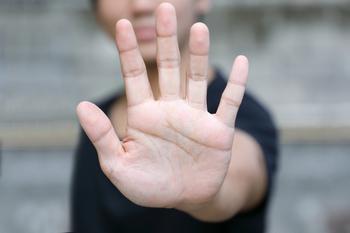The Right to Resist

When middle schoolers face pressure to do things that are not right or good for them, they have the right to resist. They have the right to say no, the right not to give a reason why, and the right to just walk away from a situation.
Resisting pressure can be hard for some people. Why?
They…
- Are afraid of being rejected by others
- Want to be liked and don’t want to lose a friend
- Don’t want to be made fun of
- Don’t want to hurt someone’s feelings
- Aren’t sure of what they really want
- Don’t know how to get out of the situation
Sometimes resisting isn’t easy, but your middle schooler can do it with practice and a little know-how. Encourage them to keep trying, even if they don’t get it right at first. Saying no is the most important part. Your middle schooler might not say it perfectly and might have to say it more than once.
Resisting Spoken Pressure
In the previous section, we discussed different types of spoken pressure, such as put downs, rejection, and reasoning. The types of peer pressure can be difficult to resist. Most people don’t want to make others feel bad, but it’s important for middle schoolers to know that they can stand up for themselves. Here are some strategies they can use to deal with spoken pressure.
Do:
- Say no assertively (See below for examples.)
- Suggest something else to do
- Stand up for others
- Walk away from the situation
- Find something else to do with other friends
And remember—stay alcohol free!
Don't:
- Go to a party where you know people will be drinking alcohol
- Attend a party unprepared to resist alcohol
- Be afraid to say no
- Mumble
- Say no too aggressively
- Act like a know-it-all when saying no
Being assertive means standing up for their own rights and solving their own problems. Assertiveness is:
- Standing up straight
- Making eye contact and looking directly at the person or group who is pressuring them
- Speaking in a firm voice, saying no, and letting them know they mean it
- Saying how they feel quickly and being polite
- Not making excuses
Added bonus: Return the challenge. Coach your middle schooler to consider saying, “I thought you were my friend,” or “I don't want to drink, and if you're my friend you won't ask me to.”
Resisting Unspoken Peer Pressure
Unspoken pressure may come from role models like parents, older siblings, teachers, coaches, or celebrities on social media or in movies and on TV. Unspoken pressure may also come from peers—friends or other people.
Here are some tips middle schoolers can use to help them resist unspoken pressure:
- Give them a reality check—most middle schoolers don’t drink
- Remember—alcohol can be very dangerous
- Walk away from the situation
- Find something else to do with other friends
Handouts for Adults to Share with Middle Schoolers
Know Your No's [PDF – 365 KB]
Role-Playing Exercise for Adults to Lead
Know Your No's
Discuss the different ways to say “No,” and what ways are most effective.
- Guide for Adult Leader
- Script to Share with Middle Schoolers [PDF – 740 KB]

